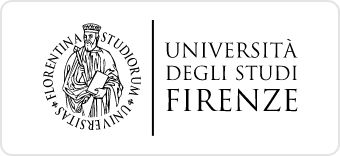UNIVERSITA DEGLI STUDI DI FIRENZE (UNIFI)
Expertise: applied and medical physics, phototherapies, photophysics, clinical microbiology. PARTICIPANT & WP LEADER

UNIFI is a major research centre that employs around 5,000 staff (lecturers, professors, research staff) and offers 126 degree courses to some 51,000 students. The biomedical and scientific areas cover all base scientific and medical disciplines, while experimental, preclinical and clinical research are also well established here thanks to the proximity of Careggi Hospital, the largest in Tuscany.
The Departments of Medicine and Experimental & Clinical Biomedical Sciences “Mario Serio” are researching innovative phototherapies applied to antibiotic-resistant bacterial models: with a patent granted for a “swallowable” light source, the idea of the “breathable” light source at the core of the “Light4Lungs” project is now being studied. These laboratories provide access to equipment such as optical inverted microscopes, imaging and spectroscopic/monochromator systems, (auto)fluorescence and darkfield imaging and spectroscopy systems, LED and Visible/NIR laser sources and detectors, spectrophotometers and fluorometer, in addition to expertise on bacterial physiology, molecular biology, biochemistry and protein engineering.
Giovanni Romano
Prof. Giovanni Romano PhD, lecturer in Applied Physics and Associate Professor, focuses on biophysics and medical physics with phototherapies, nanomedicine and biomedical optics. He is a member of the Italian (SIFB) and European Photobiology Societies, Italian Society for Optics and Photonics (SIOF), Italian Association of Medical Physics (AIFM) and the Board of Directors at SIFB.
Major ventures in developing devices for light-driven therapy include Biology of physical stresses with ASA srl, Nanobiosens with EcoBioservices srl and Probiomedica srl (its Capsulight project drew attention: Tuscany Region 2014 award for best innovative idea for startups; one of three best Life Sciences startup innovations in Italy in 2014; and health category finalist in EDF – Electricité de France pulse awards 2015).
He is also the author of 40 publications, co-author of phototherapy patent “Ingestible Capsule for Treating Gastric Infections, in particular for treating H. pylori Infections”, referee for several journals and scientific advisor for Galileo projects, 2014 (IT-FR) and SIR projects 2015.
Franco Fusi
Prof. Franco Fusi is Associate Professor of Applied Physics in the “Mario Serio” Department, Director of the School of Medical Physics at UNIFI and President of CONDIR (National Conference of Directors of Medical Physics Specialization Schools). His research interests lie in biomedical optics and photobiology, design of phototherapy units, photophysics of biomolecules and nanostructured chromophores based on gold nanoparticles for photothermal therapy, and he centres on the interaction between electromagnetic radiation in the optical range and biological tissues (applications include modelling and development of photonics-based instruments for both diagnosis and therapy: antibacterial photodynamic therapy, darkfield and (auto)fluorescence nanoparticle identification, optical properties of radiochromic films, gold-nanoparticle mediated antitumoral therapy and laser-source safety issues in biomedics).
Gian Maria Rossolini
Professor Gian Maria Rossolini is Full professor of Microbiology & Clinical Microbiology in the Department of Experimental & Clinical Medicine at UNIFI and Director of the Clinical Microbiology & Virology Unit and the Florence Careggi University Hospital. His current fields of scientific interest are antimicrobial agents and antibiotic resistance mechanisms; surveillance, molecular epidemiology and clinical impact of microbial drug resistance and of nosocomial infections; and new technologies and approaches in diagnostic clinical microbiology. He was an inventor in 11 patent applications related to diagnostics (6 of which were international), antimicrobial agents or host-vector systems for heterologous gene expression.
